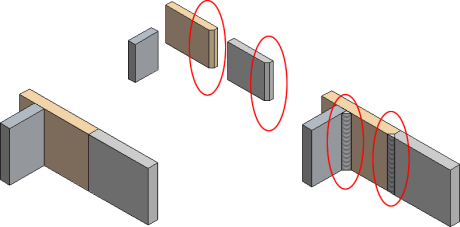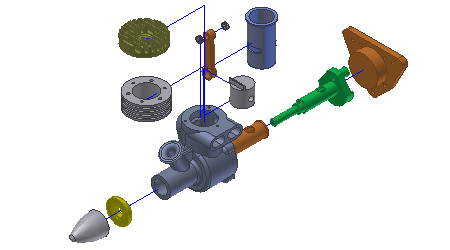When you create a base view from an Inventor model, you must specify which combination of view representations you are creating the base view for. The representations you can select from are:
The following are the different types of representations you select from:
Design view representations

A design view representation is a display configuration that you can recall by name. Design views control component visibility and material overrides, usually to present an uncluttered view of the components you intend to show in that view.
Positional representations

A positional representation is one snapshot in a collection of snapshots that show an assembly in various positions. You can access each positional representation by name.
When you create a base view, you must specify which design view representation you are creating it for.
Level of detail
A named representation saved in an Inventor assembly file, where unneeded components are suppressed or replaced with a single part representation in order to simplify the model.
Weldment states

A weldment is an inseparable assembly formed by welding together two or more pieces. Inventor models can show the weldment in different states. The “Assembly” state displays the weldment in its unwelded state. The “Welds” state displays the weldment after the pieces have been welded in place. The “Machining” state shows the weldment after post welding machining operations (if any). Additionally, you can display each individual piece with any weld preparation it may have.
The illustration shown above depicts a weldment in Assembly state, each piece in preparatory state and the weldment in Welds state.
Member
The member view representation type applies only to iAssembly factories or iPart factories.

An iAssembly factory is family of assemblies, derived off a single model, by varying a set of unique identifiers. For example, a family of flywheels with varying number of shoes.

An iPart factory is a family of parts, derived off a single model by varying parameters such as size or material. For example, a family of screws of varying lengths and diameter.
Sheet metal

Sheet metal views are available only on sheet metal part files. When creating a base view of a sheet metal part, you specify if it is to be created from the folded model or the flat (unfolded) pattern.
Flat patterns are available only if they are defined in the sheet metal part file.
Presentation view

A presentation view is an exploded view of an assembly, created to demonstrate how parts in an assembly interact and fit together.
Presentation views are available only if the model you are using is a presentation (*.ipn) file.